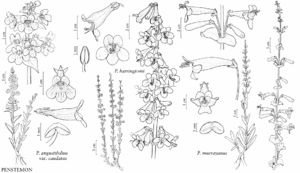Difference between revisions of "Penstemon harringtonii"
Madroño 14: 153, fig. 1. 1958.
FNA>Volume Importer |
FNA>Volume Importer |
||
| Line 10: | Line 10: | ||
|special_status={{Treatment/ID/Special_status | |special_status={{Treatment/ID/Special_status | ||
|code=F | |code=F | ||
| − | |label= | + | |label=Illustrated |
}}{{Treatment/ID/Special_status | }}{{Treatment/ID/Special_status | ||
|code=E | |code=E | ||
| Line 33: | Line 33: | ||
|discussion=<p><i>Penstemon harringtonii</i> is known from Eagle, Garfield, Grand, Pitkin, Routt, and Summit counties in northwestern Colorado (S. S. Panjabi and D. G. Anderson 2006). It sometimes grows with <i>P. osterhoutii</i>.</p> | |discussion=<p><i>Penstemon harringtonii</i> is known from Eagle, Garfield, Grand, Pitkin, Routt, and Summit counties in northwestern Colorado (S. S. Panjabi and D. G. Anderson 2006). It sometimes grows with <i>P. osterhoutii</i>.</p> | ||
|tables= | |tables= | ||
| − | |references= | + | |references= |
| − | |||
| − | |||
| − | |||
}}<!-- | }}<!-- | ||
| Line 43: | Line 40: | ||
-->{{#Taxon: | -->{{#Taxon: | ||
name=Penstemon harringtonii | name=Penstemon harringtonii | ||
| − | |||
|authority=Penland | |authority=Penland | ||
|rank=species | |rank=species | ||
| Line 54: | Line 50: | ||
|elevation=2000–2900 m. | |elevation=2000–2900 m. | ||
|distribution=Colo. | |distribution=Colo. | ||
| − | |reference= | + | |reference=None |
|publication title=Madroño | |publication title=Madroño | ||
|publication year=1958 | |publication year=1958 | ||
| − | |special status= | + | |special status=Illustrated;Endemic |
| − | |source xml=https://jpend@bitbucket.org/aafc-mbb/fna-data-curation.git/src/ | + | |source xml=https://jpend@bitbucket.org/aafc-mbb/fna-data-curation.git/src/eaa6e58056e40c9ef614d8f47aea294977a1a5e9/coarse_grained_fna_xml/V17/V17_309.xml |
|genus=Penstemon | |genus=Penstemon | ||
|subgenus=Penstemon subg. Penstemon | |subgenus=Penstemon subg. Penstemon | ||
Revision as of 19:09, 16 December 2019
Stems erect, (30–)40–70 cm, glabrous. Leaves basal and cauline, glabrous; basal and proximal cauline (15–)30–70 × (6–)13–26 mm, blade trullate to ovate or elliptic, base tapered, apex acute, obtuse, rounded, or mucronate; cauline 3–7 pairs, sessile, (10–)18–53 × (7–)12–26 mm, blade ovate to elliptic or oblanceolate, base tapered to clasping, apex obtuse to acute, rounded, or mucronate. Thyrses interrupted, cylindric, 13–30 cm, axis glabrous, verticillasters 6–10, cymes 1–4(–7)-flowered; proximal bracts ovate to lanceolate, 10–20 × 3–12 mm; peduncles and pedicels glabrous. Flowers: calyx lobes ovate to lanceolate, 3.5–7(–9) × 2–2.7 mm, margins entire or erose, broadly scarious, glabrous; corolla blue to violet, lavender, or pinkish blue, without nectar guides, funnelform, 17–24 mm, glabrous externally, glabrous internally, tube 8–11 mm, throat gradually inflated, 5–7 mm diam., rounded abaxially; stamens: 2 prominently exserted, 4–6 mm, 2 included, pollen sacs parallel or divergent, 2–3 mm, sutures smooth; staminode 7–10 mm, included or reaching orifice, 0.5–1(–1.5) mm diam., tip recurved, distal 4–6 mm densely villous, hairs golden yellow, to 1.5 mm; style 18–22 mm. Capsules 7–11 × 4–6 mm.
Phenology: Flowering Jun–Jul.
Habitat: Sandy soils, sagebrush shrublands, pinyon-juniper woodlands.
Elevation: 2000–2900 m.
Discussion
Penstemon harringtonii is known from Eagle, Garfield, Grand, Pitkin, Routt, and Summit counties in northwestern Colorado (S. S. Panjabi and D. G. Anderson 2006). It sometimes grows with P. osterhoutii.
Selected References
None.
